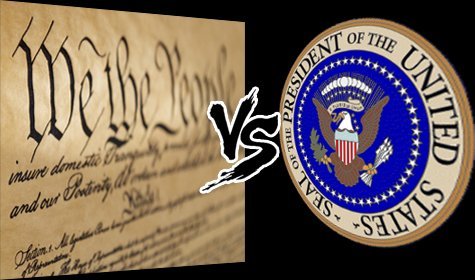In September of this year, PBS aired a Ken Burn’s documentary titled The Roosevelts: An Intimate History. Within the 14-hour documentary, Presidents Teddy and Franklin Roosevelt were endowed with the splendor for being men of great “vision”. Men with such prowess, could not be confined by such nuisances as the U.S Constitution and that we are so blessed to have God bestow such individuals upon us. These men were treated with nothing less than religious veneration, as they poked and prodded the country to their ultimate utopia.
The American medias cult-like obsession over the President is clearly visible today when they fawn over when and where the President takes his vacations, golf outings, restaurant choices and even his favorite college basketball picks. But, if our nation functioned in the manner that the Constitution was designed, such notions of the presidency would be extremely foreign to us.
The generation alive during the ratification of the Constitution considered the notion of a “great leader” as something very suspect. In fact, the largest opposition to the position of President was the fact that many people believed that they were simply replacing the King of England with a “King” of the United States. Alexander Hamilton had to go to great lengths to explain to the people in Federalist Papers Number 69, 70, 71, 72, 73, and 74 that something like that could never happen and exactly what the powers of the Executive Branch would have.
He outlined that the duties of this office would be bound to only those listed in Article 2 of the Constitution and that the role consisted of:
- Enforce acts of Congress and judgments of the Federal courts (except when those acts violate the Constitution)
- Appoint key positions
- Fill the role of Commander-in-Chief after war is approved by Congress
- Grant pardons and reprieves
- Make and form international treaties
- Report to Congress the state of the country – popularly known as the “State of the Union”
In fact, he likened the position of president to be no greater than the governor of New York, and in some instances, even inferior to it. The office of the president was to feel nothing of the levels of grandeur we see today. The great early American observer, Alex de Tocqueville, wrote that the American President has
Furthermore, Thomas Jefferson noted that the Constitution should be the solution to limiting Executive power when he wrote, “In questions of powers, then, let no more be heard of confidence in man, but bind him down from mischief by the chains of the Constitution.”
The Executive branch has been distorted so profoundly from our founding principles. Today, we debate such notions as what can be done when the president decides to make law via Executive Orders. The very notion of such unconstitutionality was unfathomable to the ratifiers of our present day Constitution and should serve as a lesson and wake up call to how far we have strayed in the reigning in of our modern day Executive Branch.

